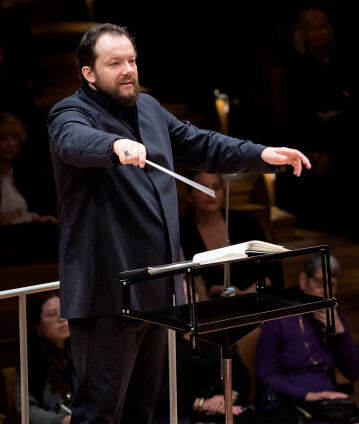Andris Nelsons conducts Mahler’s Second Symphony

Gustav Mahler’s Second Symphony is a work which exceeds all limits. The composition was intended to depict nothing less than the entire universe: the lofty and the humble, tradition and avant-garde, pastoral serenity and demonic grotesques, songs and chorales, and death and resurrection, all expressed in music that is correspondingly multifarious and grandiose. It is conducted here by Andris Nelsons, music director of the Boston Symphony Orchestra and kapellmeister of the Gewandhausorchester Leipzig.
Mahler had been looking for a suitable form for his all-embracing work of art for a long time. He then attended the funeral of Hans von Bülow, the first great chief conductor of the Berliner Philharmoniker: “The choir, in the organ-loft, sang the Klopstock Resurrection chorale,” he wrote. “It was like a flash of lightning, and everything became plain and clear in my mind!” Klopstock’s words confirmed for Mahler what he had long been considering: to use a chorus in the final movement, along with solo soprano and alto vocalists.
In this five-movement symphony, Mahler brings together a variety of genres – symphony, tone poem, symphonic cantata – and in doing so, blows the usual formal scheme apart. The opening movement, which is characterised by a sombre, march-like main theme and a lyrical, seemingly celestial secondary theme, describes the funeral of a loved one. It forms the counterpart to the great choral finale which follows on from apocalyptic tones in Klopstock’s hymnal poem Resurrection. The three short middle movements take the listener to completely different worlds: to a cheerful dance, to fish in the water, and the prayer scene of an innocent, devout soul. In the third and fourth movements, Mahler integrates two of his Wunderhorn songs, Des Antonius von Padua Fischpredigt and Urlicht. For the premiere, the composer engaged the Berliner Philharmoniker who initially presented the first three movements in March 1895, and the entire symphony the following December. The press responded to the monumentally orchestrated work with incomprehension. It was not music, but “cacophony, scandal, nonsense, turmoil”.
With Andris Nelsons – who in addition to his chief position with the Boston Symphony Orchestra is also Gewandhauskapellmeister in Leipzig since February 2018, and who is joined for this concert programme by the MDR Rundfunkchor Leipzig, the soprano Lucy Crowe and alto Gerhild Romberger – we have a conductor at the helm of the Berliner Philharmoniker who was a fan of Gustav Mahler’s music from an early age. “This music speaks so closely to me,” he confesses. “There is everything in his music, from naive childishness to the greatest catastrophe, in his symphonies is a whole world.”
© 2018 Berlin Phil Media GmbH
Related interviews
Artists
Our recommendations
- A Mozart evening with Daniel Harding
- Emmanuelle Haïm conducts Handel’s “Music for the Royal Fireworks”
- Gustavo Dudamel conducts Mahler’s Third Symphony
- Mikko Franck conducts Schumann’s “Paradise and the Peri”
- Simon Rattle conducts Janáček’s “The Cunning Little Vixen”
- John Eliot Gardiner conducts Brahms and Mendelssohn